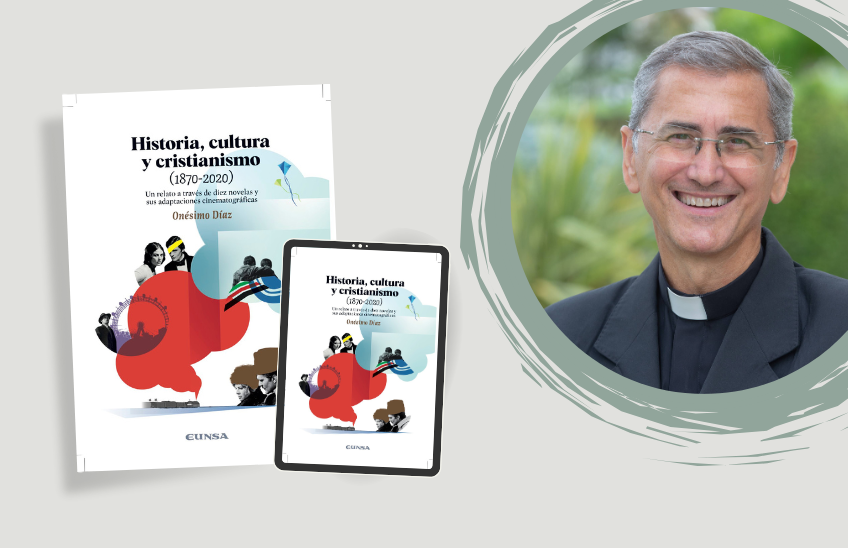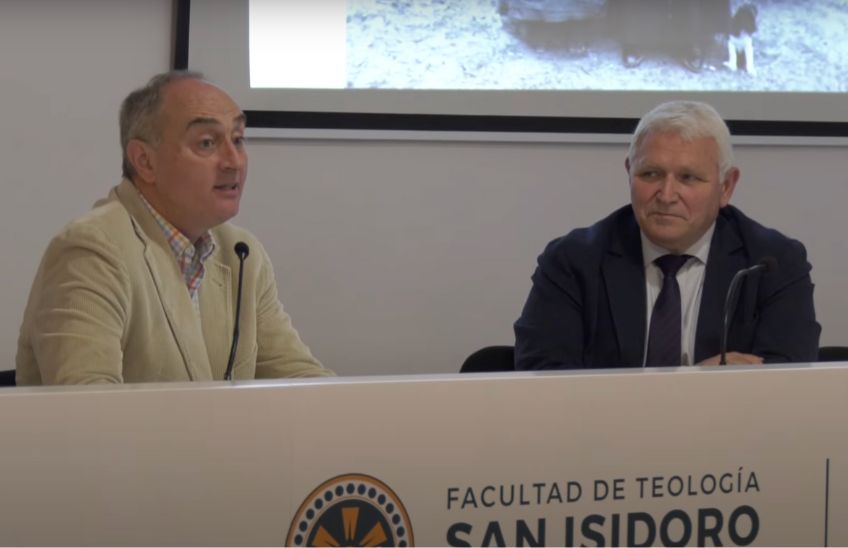Luis Cano: "The Letters of St. Josemaría help us to grow in our Christian life".
Luis Cano, researcher of the St. Josemaría Escrivá Historical Institute, explains in this interview how the Letters of the founder of Opus Dei are a tool that financial aid helps Christians to deepen their relationship with God.

24 | 05 | 2024
The St. Josemaría Escrivá Historical Institute, based in Rome, has been working for more than two decades to prepare an edition of the complete works of St. Josemaría. A group of researchers, group , has studied and classified the abundant material in five series: Published Works; Unpublished Works; Epistolary Works; Autographs; and Oral Preaching.
Among the unpublished works of this saint there is a good issue of Letters, whose spiritual and practical reflections allow us to delve into the universal call to holiness.
The Letters, which are addressed expressly to the members of Opus Dei, illuminate the entire pathway of the Christian life. For this reason, St. Josemaría wanted them to be accessible to those who are interested in knowing and living the message of holiness in the midst of the world.
In this interview conducted by CEJE, researcher Luis Cano details some of the key points of the Letters and explains the process of essay and the importance of their content in view of the centenary of Opus Dei.
For some years now, the St. Josemaría Escrivá Historical Institute (ISJE) has been working on the edition and publication of the Complete Works of the founder of Opus Dei. Could you explain the purpose of this project?
At the ISJE, one of our objectives is to bring to light the unpublished works of St. Josemaría, of which there are still many. We want them to be available not only to people connected with Opus Dei, but to the whole world. Our goal is to ensure that the editions we publish are faithful to the original manuscripts he left behind. This process involves an exhaustive comparison of all the corrections made by the author, since many of these manuscripts were revised by St. Josemaría on multiple occasions over the course of several years. This is what we call a critical edition.
They are not complicated texts that require a great effort to understand. For this reason we present them in their original form, only adding explanatory notes on occasion to contextualize certain aspects that might not be known today. Basically, our goal is to obtain a faithful text, clean of possible errors, with a brief contextualization and, when possible, to tell the story behind the text.
Among these works there is a good issue of Letters of St. Josemaría, which he did not publish during his lifetime. What is their relevance today?
When we mention the Letters of St. Josemaría we are not referring to his epistolary collection staff, which is quite extensive, but to a particular literary genre. These letters, some of which are very long, deal with specific topics.
In his writing, St. Josemaría adopts an approachable tone. His style is more like that of a family conversation that the founder had with members of Opus Dei throughout the ages. The tone is similar to that which he used in his gatherings with members of the Work, in which he transmitted to them the spirit, history and traditions of the institution.
The Letters of St. Josemaría help us to grow in our Christian life. Their content continues to have great relevance today because they deal with key issues for following Jesus Christ in the contemporary world, offering a variety of perspectives for different paths of life.
They are very rich teachings, in which we find reflections on different issues: humility in the spiritual life, freedom and respect, the spirit of service, among other aspects that make up the life of a Christian.
Could you provide more details about when St. Josemaría wrote and sent these letters?
We have little information about this process. We know that St. Josemaría developed the themes of these Letters throughout his life. During the 1930s he began to collect material and perhaps also wrote down some of the central ideas. Later, in the 1940s, 1950s and especially in the 1960s, he worked on his essay. Sometimes he used an engraver, and later, a person helped him to transcribe and correct the texts. Other times, he would ask for a draft to be made with the material he had. Then, he would edit and revise them, over and over again, until he got them just the way he wanted them. This process probably continued until the early 1970s.
St. Josemaría assigned a date to each Letter, as is common in this literary genre. In reality, their content is timeless and makes few references to contemporary events, and the dates do not always correspond to the exact moment of his final essay . Rather, these dates served to remind him of the times when he had considered the themes treated in the Letters, or had preached them, although not in their form final.
Is there any unpublished material still unpublished?
There is still much unpublished material. To date, we have published eight Letters in the Collected Works volumes, and in 2023 Letter issue 29 was published in the journal Studia et Documenta. I am currently working on the third Issue, with five Letters that I hope to finish soon. However, we estimate that we still have ten or twelve more volumes of Letters alone. These texts require a thorough reading, so we plan to publish them with a certain periodicity so that the reader can better assimilate their contents.
In addition to the aforementioned material, we have a considerable amount of transcriptions of talks, meditations and gatherings of St. Josemaría, as well as his letters, which allow us to learn more about St. Josemaría from a biographical point of view. There is also a series of miscellaneous writings that include his intimate notes and other texts. To approach this material, we have developed a methodology of work that allows us to advance towards our goal of making known unpublished texts of the founder, in critical editions.
It is important to point out that the publication of this material is done without many comments or clarifications, unlike other works that have been done in recent years, such as the critical-historical editions of books by St. Josemaría that were already published, such as The Way, Christ Is Passing By, Holy Rosary, among others.
Opus Dei is currently approaching the centenary of its foundation, an important moment for understanding its own identity and history. How do the Letters of St. Josemaría contribute to this challenge?
In my opinion, the Letters play a fundamental role in this process. First of all, they offer a clear orientation for understanding the mission statement that God has entrusted to Opus Dei and the reason why God wanted this great family. This understanding provides us with a solid foundation that allows us to face the challenges with confidence.
Secondly, the Letters remind us that evangelization is a task of all and for all. It requires a very great involvement of Christians in society through active secularity and the search for God in all circumstances of daily life. This transforming message has had a profound impact on many people, showing us that our daily actions are very pleasing to God and we can turn them into prayer.
Opus Dei is not only an organization, but, as St. Josemaría used to say, it is above all a "little part of the Church. In reality, it could be said that each person in the Work "is" Opus Dei wherever he or she is. He has a concrete mission statement to carry out, a clear message, a spiritual financial aid that comes to him from many other people and that financial aid him to be faithful to Jesus. The organization does not act, the person does it, with his own responsibility. It is as if there were not one, but 90,000 small Opus Dei -as many as there are members- scattered around the globe. Just as each Christian "is" Church, so too each member "is" Opus Dei in his town, in his place of work, in his place. There he should try to bring the light of Christ to all places, as the central ideas of the letters that St. Josemaría left us remind us. He was aware that with time there was a risk that this marvelous message could fall into oblivion or be ignored. That is why he made a great effort to leave his inspiring words in these texts, which are thousands of pages long.
It seems to me that in view of the centenary, each one of us can succeed in making a synthesis staff of its contents, which can penetrate and change our inner self, in order to impel us to bring Christ to all people and everywhere, wherever we live and work.
___________________________
Related content:
Podcast Fragments of history, "The letters of St. Josemaría. Interview with historian Luis Cano.



